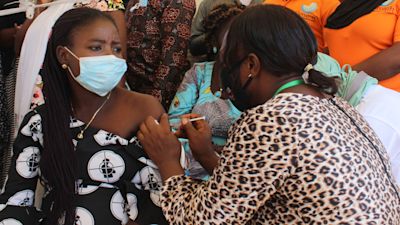More Covid variants likely to develop if poorer nations remain unjabbed, Boris Johnson warned

A group of leading scientists have warned the government more Covid variants of concern are likely to develop if poorer countries remain unvaccinated, as they accuse wealthy nations of pursuing a “reckless approach to public health”.
A letter signed by more than 300 experts, including 13 members of the government’s Scientific Advisory Group for Emergencies (Sage) in a personal capacity, says vaccinating most of the world's population is the most effective way of preventing the development of future strains.
Experts have called on Boris Johnson to support global efforts to suspend intellectual property rules that stop lower-income nations from manufacturing Covid-19 vaccines, tests, and treatments.
Currently more than three billion people worldwide remain unvaccinated.
Listen to the latest episode of ITV News' podcast, Coronavirus: What You Need To Know:
The letter warns: “Allowing huge numbers of people in low- and middle-income countries to remain unvaccinated is a reckless approach to public health that creates conditions where new SARS-CoV-2 variants of concern are more likely to develop.
“Indeed, the Omicron variant was first identified in Botswana and South Africa, on a continent in which fewer than one in ten are fully vaccinated.
“Thanks to remarkable scientific innovations, we have a number of vaccines that remain highly effective against all known Covid-19 variants.
“Yet, unless we share this technology with the world and increase global vaccination coverage, vaccines will not be effective at stopping new variants of concern."
A fellow at the UK Health Security Agency, and an adviser to the Joint Committee on Vaccination and Immunisation also signed the letter.
It comes after the head of the World Health Organization said that conditions remained rife for more variants to emerge, as he cautioned that countries should not assume Omicron will be the last.
Dr Tedros Adhanom Ghebreyesus said reaching the WHO’s target to jab 70% of the population of each country by the middle of this year would help to end the pandemic as a global health emergency by the end of 2022.
“For far too long, health has been compartmentalised and deprioritised, nationally and internationally. It’s time to recognise that if we fail to invest in health, we fail to invest in the future,” he said on Monday.
A UK government spokesperson said: “The UK is working to ensure developing countries can access Covid-19 vaccines.
“Our significant early commitment to Covax has already helped to deliver more than one billion doses to developing countries, while we continue to donate our own domestic surplus.
“We recognise and share concerns regarding the level of vaccination in some parts of the world, and we are working on tackling the underlying issues including manufacturing and supply constraints, pressure on health systems, and vaccine confidence.”